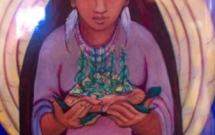
When One Transitions, We All Transition
by Ann Filemyr
Our granddaughter announced his decision to become an F to M Trans Boy. Okay, I am ready, I thought. Well, not completely ready, I discovered.
I should be ready. I came out in 1977 as a bisexual. I was precocious, adventurous and fully engaged in the pre-AIDS era of sexual exploration and experimentation. I had boyfriends and girlfriends. I knew I didn’t want to get married and behave like the heterosexual women of my mother’s generation. I didn’t believe in monogamy. Messages my mother gave me about female identity included the statement that “women are second class citizens.” I was ambitious. I wanted to be first-class.
Influenced by second wave feminism, especially the radical and cultural aspects of that great tidal wave crashing upon the shore of U.S. society, my identity kept shifting on the wet sand. I cut off my hair and dressed like a boy. Back then we called it being androgynous. We loved Ziggy Stardust. I learned that snails, slime mold and other beings in Creator’s magnificent universe did not reproduce through a binary gender system. In Judy Grahn’s anthology, True to Life Adventure Stories, I read a short story, Boys at the Rodeo, about a group of lesbians attending a rodeo in Wyoming who were mistaken as boys. Once the cowboys accepted them as young, rambunctious males, those dykes had a blast. Unlike the then-popular phrase, “Blondes have more fun,” it seemed to me that boys had more fun.
At 20, I hitch-hiked alone across Scotland. I left behind a beautiful long-haired man in Wisconsin and a feisty athletic woman in Michigan. Lugging my backpack, I stuck out my thumb and pretended to be a boy. My ruse was not entirely successful despite my cropped hair, flannel shirt, baggy pants and worn-out sneakers. Once I climbed into the back seat, the driver would generally say, “Thought you were a boy,” which meant that already my voice or gestures had given me away. So much for that. I let my hair grow out and slowly grew to embrace my emerging identity as a power-femme.
Gender is performance. As a young adult, freed up by 1970’s lesbian culture, I was able to perform my inner boy. I enjoyed it but not enough to abandon my inner girl. At that time society presented me with a narrow choice: man or woman; male or female. Pretty limiting, but I found ways to straddle the categories.
Today I wear summer dresses, paint my toenails and flip up my long hair. But I also hike in sturdy boots and camp in the wilderness beneath the naked stars. I am unafraid. I am fiercely independent. I settled down and married a woman. Between us we share the stereotypical male roles in the old-fashioned husband-wife dynamic. I handle most of the financial and legal matters. She handles most of the power tools for household maintenance, yardwork, carpentry, that stuff. I mean I can spackle drywall or drive a nail into a two by four, but she does it better. I guess I am a gender-bending person in my own way.
The next generation is doing what they should to race through the door kicked open by gay rights activists and second wave feminists. They inherited the social and political spaces created by those who dared to question strict gender roles and the suppression of both female and homosexual lives. It’s not that the violence and hatred against us has ended, but the legal system and public opinion have shifted. I myself have benefited by this extraordinary movement toward human liberation.
So why am I having difficulty with my grandchild’s transition? I recall the bright face of the baby whose diapers I once changed, the toddler whose bedtime stories I once read, the small, rambunctious one for whom I drove around in the humid Ohio night singing to the moon so she would fall asleep. Did I make up stories in my mind about the woman this child would become? Did I get attached to my stories of make-believe?
Or do I feel a sense of loss because we have worked so hard to lift up female identity as valued, relevant, vital and necessary to change the oppressive domination of our world. You see, I love being a woman. I am interested in and deeply committed to women’s lives, voices, empowerment and spirituality. I understand the menstrual cycle, the pregnancy cycle, the mothering process, the struggle of being female under male domination, the silencing effect on girls and women inside patriarchal systems, and the profound desire to share authority in the world differently than the dominator-power-over style used by our government, police, academic institutions and families. Though I am part of the LGBTQ community, I strongly identify as a woman and care deeply about the lives of girls and women. Yet my grandchild was born female and is choosing to live her/his life as a trans male.
Since I came of age during that era of name-changing, identity-switching liberation, I should be ready for anything. I should be fine about a girl I adore becoming the boy I will adore. For her/him, this decision has been years in the making. I remember going into the boys clothing department to help her choose clothes she wanted to wear. I recall the summer the luscious long hair was first cut short. Emerging today is a confident, articulate, intelligent, stylish, young performance artist who can sing, dance, direct, conceive and execute original theatrical material. I am proud. Her decision to transition into living this life as a trans boy has made him very happy. I can see that. It fits. It seems right. Still in brief moments I catch myself mourning for the girl who is no longer there, and who is not going to become a woman.
Native communities use the term, Two Spirit. I like it. It suggests a spiritual aspect to the act of transgressing gender divisions. Two Spirit advances the possibility of living within a state of consciousness that embraces gender-duality-becoming-unity. It is both/and: both male and female; both straight and gay; both old and new. Perhaps it is even more than that. Two Spirit goes beyond gender-based identity boxes. It signifies someone filled with the power of Two Spirits. Am I Two Spirit? Is my grandchild?
Once we get beyond the public bathroom debate, I look forward to what other new social and political spaces will open up for all of us. If our society can make room for all of the myriad gendered expressions in the emerging trans-youth of today, how much freedom could we all experience?
Trans-identity is now part of our family. This means, I, too, must transition. Though my tongue still stumbles over the pronoun change, I will get it. One day he will slip effortlessly from my mouth when I refer to my beloved grandchild. I know I can do it.
 Southwestern College Santa Fe, NM
Southwestern College Santa Fe, NM




